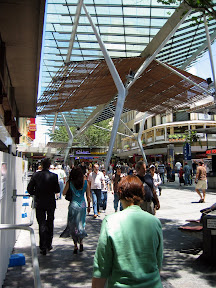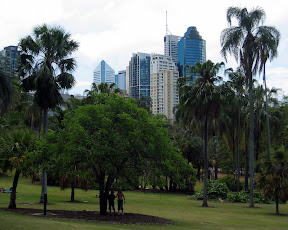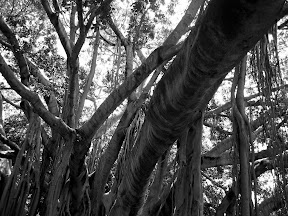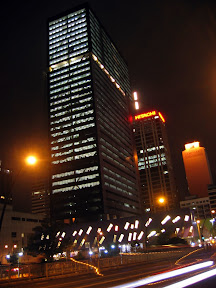Sunday, November 05, 2006
The Boston Brogue
This morning was sunny. I knew it was going to be a hot day. (For a change, since the last two days had rained.) I walked on the riverfront. Today there were arts and crafts stands set up there. Brisbane sits on a river. There are a lot of jetskis and ferries on the water, but it is by no means as busy as Sydney Harbour.
I cut over to Queen St Mall. Tons of people strolled in and out of the shops—I observed them as they walked past me. Brissies appear gaudier than Sydneysiders. They wear clothes with loud colors and show lots of skin. Guys tote bright backpacks. The locals here aren't in better shape than Americans, but they dress like they are. Brissies love to bike. (Running isn't as prevalent as in Sydney.)
I spent a while in the City Botanic Gardens. It's a little smaller than Sydney's, but it's still good for a relaxing couple of hours lying in the grass.
Then I crossed the river to South Bank. It's a narrow strip of land on the riverbank opposite the city center. This was my favorite part of Brisbane. It has a wide walkway for pedestrians and cyclists (boy, are there a lot of bicycles). The promenade is lined by landscaping and pretty arches of bougainvillea. There's even an artificial lagoon. Called Streets Beach, it was packed on this sweltering day with kids. On the other side of the strip are shops and cafes, which were just as crowded as the lagoon. A countless number of young adults flocked here, probably students from the universities that are nearby. South Bank looks like a success in urban planning. If I ever move to this city I could see myself spending a lot of time here.
Late in the afternoon I visited the Queensland Museum. It tells you everything there is to tell about Queensland. I saw interesting dioramas with native animals and learned neat facts like Australia is the world's largest coal exporter.
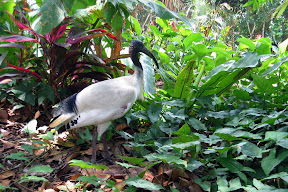
Australian White Ibis, common sight in city parks
In the evening I went to the cheapest movie theater in Queensland (US $4 for a Sunday evening show) to watch Martin Scorcese's The Departed. (Australian cinemas have variable pricing, meaning that movies are cheapest during the week and most expensive on the weekends, when they are busiest. This strikes me as good economics—you follow the demand curve by lowering prices when demand is lowest. Even better would be to lower prices for moviegoers who sit through the ads showing before the film. In a sense, their tickets would be subsidized by the advertisers.) The Departed was the most popular film in the States when I left; this Aussie movie house had a good turn out, as well. I liked the production and acting of the star-studded ensemble very much. My appreciation was partly due to an affinity with the Boston locations and accents. It felt a little strange to watch this regional American film in a foreign country, but I think a mild feeling of alienation from my surroundings drew me closer to the familiar sights and sounds on the silver screen.
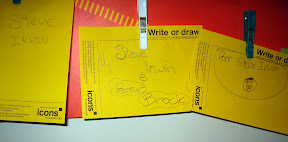
Question to Queensland primary school students: "What is your favorite icon?"
After the movie ended I walked through South Bank back to the center. South Bank is eerily quiet at night. Neon lights flicker on deserted streets. Nighttime here makes stark contrast to the day. This neighborhood is indeed a miracle of urban planning—I didn't see a single piece of litter.
Thoughts on Brisbane:
- Australian customer service is appalling. I'm used to customer service agents treating me respect and making sure that I am satisfied with their service. ("Is there anything else I can help you with today?") But here, both in person and over the phone, Aussies come off as condescending and impatient. ("Actually, I think you're wrong. It's like this....") I suppose they don't care what their customers think—they get paid high wages anyway. I saw a job posting in my hostel for temporary work. The job is shagging golf balls: $15 an hour! (That's only US $12, but that's still good money.)
- Brisbane has a large minority population. The two largest communities are Chinese and Korean. There are a lot of Muslims, too, probably from South and Southeast Asia. Some restaurants display "Halal" signs in their windows.
- Bananas cost a fortune. Unlike California, Australia grows their bananas domestically, in Queensland. Unfortunately, there was a cyclone this winter that wiped out the entire crop. The few fruit that survived are basically a luxury item. One kilogram costs $9.99, or US $3.50 per pound! Other fruit like mandarin oranges are also more expensive than in the States, but avocados and mangoes are cheaper.
